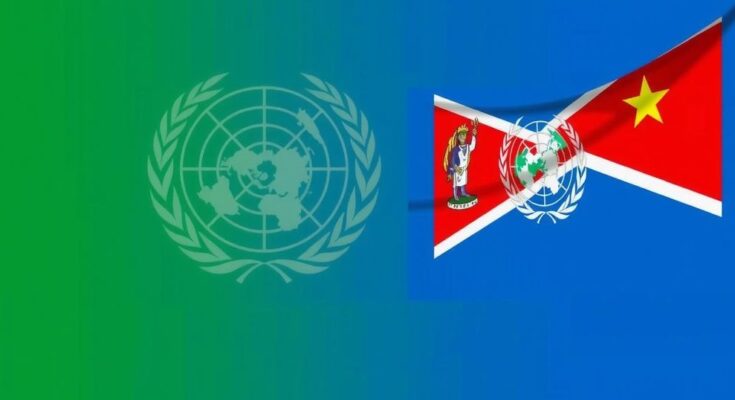Papua New Guinea has declared its intention to boycott the upcoming UN climate summit, deeming it ineffective. Foreign Minister Justin Tkatchenko criticized major polluters for failing to deliver on their promises and highlighted the country’s vulnerability to climate change. The decision represents broader frustrations among smaller nations and a shift toward seeking direct bilateral climate agreements with cooperating nations like Singapore.
Papua New Guinea has announced its intention to boycott the upcoming UN climate summit, characterizing the global discussions on climate change as a “waste of time” that are rife with unfulfilled promises from major polluters. Foreign Minister Justin Tkatchenko, speaking to AFP, expressed skepticism about the effectiveness of the summit, stating, “There is no point going if we are falling asleep because of jet lag because we are not getting anything done.” He criticized the assurances made by large polluting nations, indicating a disconnect between commitment and action, saying, “All the big polluters of the world promise and commit millions to assist in climate relief and support. And I can tell you now it’s all going to consultants.” Papua New Guinea, noted for having the third-largest rainforest in the world, is especially vulnerable to climate change, facing numerous natural disasters and other dangers associated with global warming. Tkatchenko asserted that the current format of the COP meetings does not yield tangible results: “COP is a total waste of time… We are sick of the rhetoric as well as the merry-go-round of getting absolutely nothing done over the last three years.” The COP summits have historically resulted in significant agreements, such as the Paris Agreement of 2015. However, they have faced increasing criticism due to perceived inefficiencies and the slow pace of action on climate commitments, with Tkatchenko emphasizing that the nations at these meetings have failed to make progress. Furthermore, he indicated that other Pacific nations, which share similar grievances, support Papua New Guinea’s decision to withdraw from the talks. In lieu of attending the summit, Tkatchenko stated that Papua New Guinea will pursue bilateral agreements to address climate issues, highlighting ongoing negotiations with Singapore. He posited that partnerships with countries willing to acknowledge their carbon footprints and collaborate on solutions could be far more productive than participation in the COP framework. The decision reflects a growing frustration among smaller nations that feel underrepresented and unacknowledged in larger international dialogues. The Foreign Minister concluded that the country would focus on making more meaningful contributions to global climate initiatives through direct negotiations with like-minded states.
The announcement by Papua New Guinea to boycott the upcoming UN climate summit stems from longstanding frustrations with the dynamics of international climate negotiations, particularly the perceived inaction of major carbon emitters. As one of the nations most vulnerable to climate change impacts, especially given its extensive rainforest, Papua New Guinea’s voice reflects the concerns of many small island states that seek substantive change rather than rhetoric. The call for a boycott underscores the growing impatience with established climate dialogue formats that some members view as ineffective in addressing urgent climate challenges.
Papua New Guinea’s decision to boycott the UN climate summit illustrates a significant shift in how some nations perceive the effectiveness of international climate negotiations. By prioritizing bilateral agreements and seeking proactive partnerships, Papua New Guinea is attempting to forge more actionable paths to combat climate change, advocating for the needs of smaller nations that feel overlooked in global discussions. This stand may inspire other nations to reevaluate their participation in such forums, prompting a broader discussion on the future of international climate policy.
Original Source: www.voanews.com




